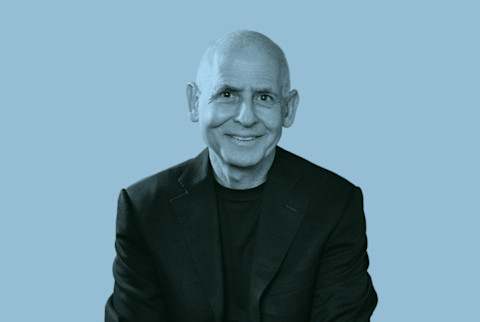A Neuroscientist's 4 Nonnegotiables To Enhance Brain Health & Happiness

To lighten your mood and melt away negativity, you have to start with basic brain health. Your brain is an organ, after all, and its proper function is the foundation of cognitive and emotional well-being. "If you get your brain right, odds are you're going to think right, you're going to feel right, and you're going to behave right," says clinical neuroscientist psychiatrist Daniel Amen, M.D., author of You, Happier: The 7 Neuroscience Secrets of Feeling Good Based on Your Brain Type, on this episode of the mindbodygreen podcast.
To that end, Amen shares some nonnegotiable brain health tips that can ultimately help you become a happier person. Below, find his practical advice for a positive mood long-term:
Cultivate purpose.
A sense of purpose affects your mood in a very specific way: "Purpose, all by itself, increases dopamine, but it doesn't dump it—it drips it," Amen shares. You see, the more dopamine your brain produces, the more it starts to "wear out the pleasure centers in your brain," says Amen, and your brain craves more and more of it. While purpose does increase dopamine, it doesn't frontload your brain with it—rather, it keeps it at a steady pace over time.
Plus: "Purposeful people live longer," declares Amen. "They're happier, they have better relationships, and their overall physical health is better." And when all of those aspects are thriving, a positive mood doesn't fall too far behind.
As for why a sense of purpose enhances just about every facet of your body and brain health, Amen believes it's all about connection. "When your life is all about you, you're not connected," he explains. Whereas if you have a bigger purpose in life, you're able to see outside of yourself and connect to a larger force. "And our connections are absolutely essential, foundational to happiness," he says.
Consume brain foods.
The foods you eat can affect your brain health—Amen isn't the only expert on board with the idea, but he does have a few personal favorites. "I'm a huge fan of berries," he says. "Get as many different colors as you can—blackberries, blueberries, and raspberries." These deeply hued berries contain flavonoid antioxidants called anthocyanins, which likely play an important role in brain and overall health1. On that note, Amen also suggests adding as many colorful veggies as you can fit onto your plate. As a general rule of thumb: The more colors you can include, the better.
"I'm a big fan of healthy, sustainable fish high in omega-3 fatty acids," he continues, as well as fatty-acid-rich olive oil, nuts, and seeds. "My favorite nut is a walnut because it looks like a brain and is high in omega-3 fatty acids," he explains. (Eating more walnuts more often has even been linked with improved longevity in both men and women!) "And my favorite seeds are pumpkin seeds, because they've been found to increase dopamine availability in the brain2," he adds, thanks to an amino acid called tyrosine. If you have a lull in the afternoon, pumpkin seeds can help."
Know your brain type.
Amen and his team at Amen Clinics have identified five primary brain types: balanced, spontaneous, persistent, sensitive, and cautious. "You have to know your brain type to know what makes you uniquely happy," Amen explains. Some brains thrive on calming, feel-good music; others get a thrill from surprises, like impromptu road trips, and daring activities, like bungee jumping; and some get a surge of dopamine from simply being in charge. Know your own brain type, Amen explains, and you can identify the happiness strategies that work best for you. (See here for the full breakdown.)
Treasure-hunt technique.
Ultimately, enhancing your happiness can be as simple as a five-minute practice, like Amen's treasure-hunt technique. "Every night before I go to bed, I say a prayer," he explains. "I go on a treasure hunt, and I ask myself what went well today. I start at the beginning of the day, and I search through each hour of what happened that made me happy." You can even write down your thoughts in a journal, if that helps you keep track.
Think of it like a bedtime gratitude practice that primes your mind for positivity. "I'm actually setting my dreams up to be more positive, which also means I'm going to be happier tomorrow," Amen shares.
The takeaway.
Implement Amen's four tips for happiness, and you'll likely have a more positive mood long-term. Much of his advice (like brain foods, purpose, and gratitude) has downstream effects on memory and general cognitive function, anyway, so it's like a two-for-one deal for a healthy brain—that's certainly something to smile about.
And don't forget to subscribe to our podcast on iTunes, Google Podcasts, Spotify, or Amazon Music!
